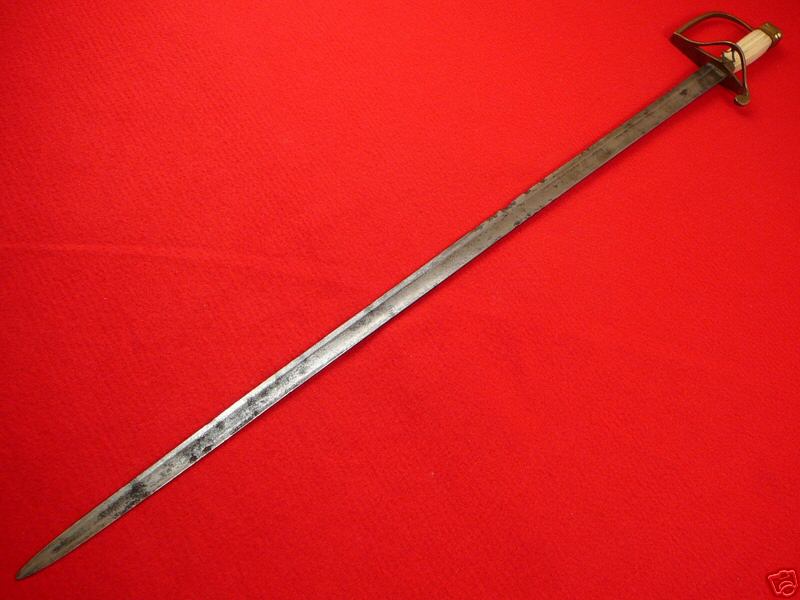
Its an English Model 1786 Spadroon or otherwise known as an Epee' Anglaise. Lovely.
 Attachment: 58.47 KB
Attachment: 58.47 KB


Another Shot.
 Attachment: 28.69 KB
Attachment: 28.69 KB
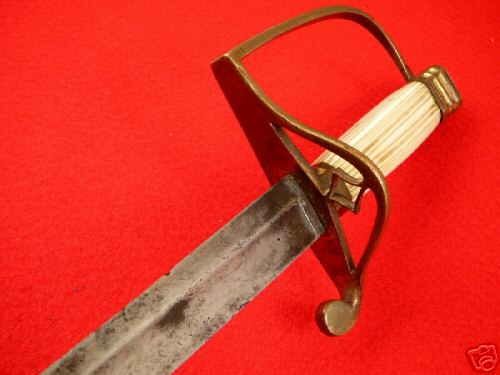

Excellent! I was watching this auction. When do you expect it?
Jonathan
(You've had quite a run of collecting recently! :) )
Jonathan
(You've had quite a run of collecting recently! :) )
Ive got to pay for it and the 1818 Nathan Starr Sabre. So probably next week. I've been trying to contact someone I traded a 1848 Bohemian light cavalry saber to, in hopes of maybe buying it back. I guess when I started collecting or aqquiring, I was very much interested in modern reproductions of period swords and swords that I could fight with. And while I still fence, its not my burning priority. I have of late reflected on the very nice antique swords that I have let slip thru my fingers in the past (like my 1796 pristine heavy cavalry dress sword and scabbard sob, and my 1840 U.S. artillery sabre and scabbard) and decided to reinvest. I like holding a piece of history in my hand. Of course in the 80's and 90s you could get just about anything for up to 300 bucks. Its amazing to me how the prices have skyrocketed.
I was watching this too :) Congratulations!
Thanx, I was suprised that I got it. I only bid 20 more dollars and then left work. Whodathunkit? Also here are some pics of my Nathan Starr saber.
 Attachment: 14.45 KB
Attachment: 14.45 KB
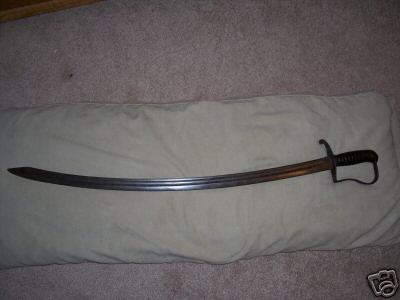

I like spadroons quite a bit and have adopted three to date. This one of yours has a hilt element I have seen on some other swords. One reference book lists a Thurkle example that displays it but I have been advised it is not unique to his efforts. The first example here was a sword listed at Shilo Relics a couple of years ago and the second is currently listed on the Gunbroker site. Quite a few decades seperate these two, so it's interesting to me that the diamond element spanned so much time.
Cheers
GC
 Attachment: 38.87 KB
Attachment: 38.87 KB
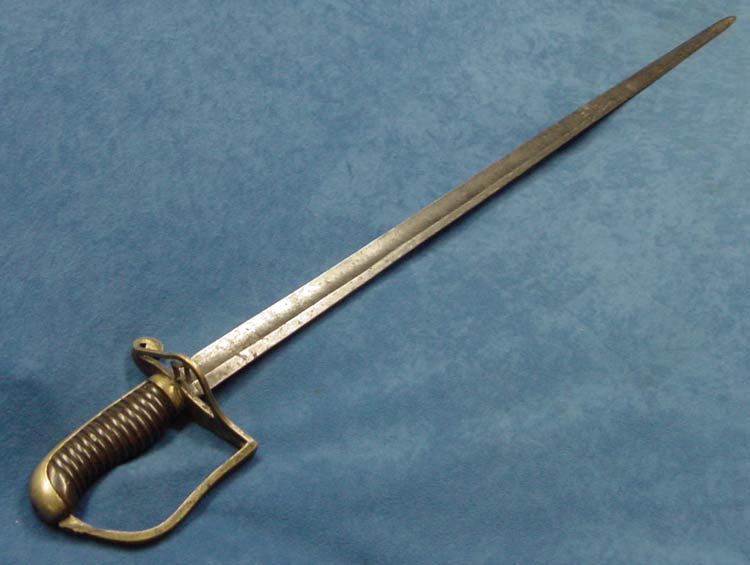
 Attachment: 29.52 KB
Attachment: 29.52 KB
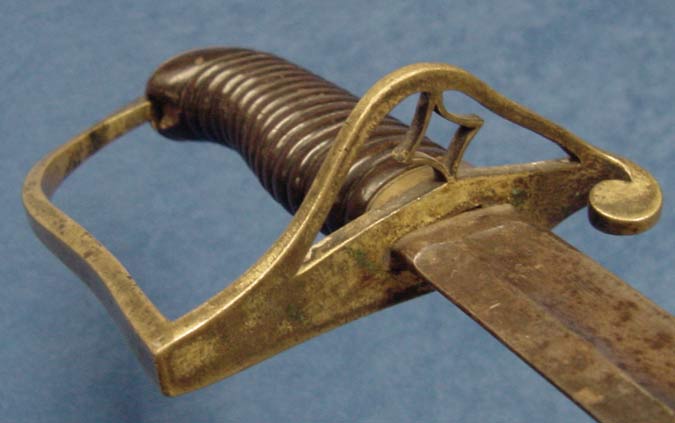
 Attachment: 25.36 KB
Attachment: 25.36 KB
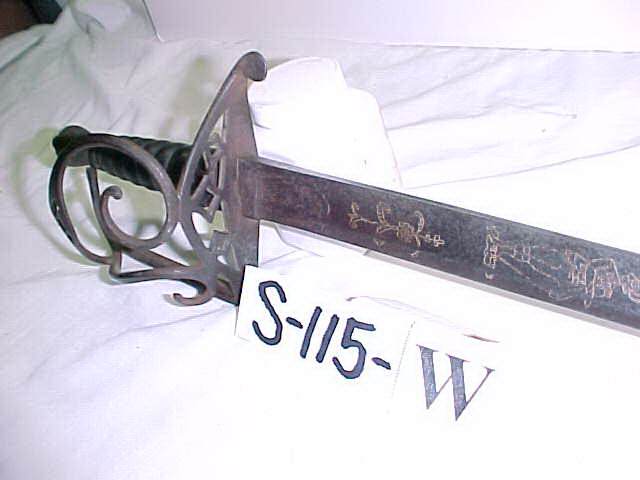
 Attachment: 22.14 KB
Attachment: 22.14 KB
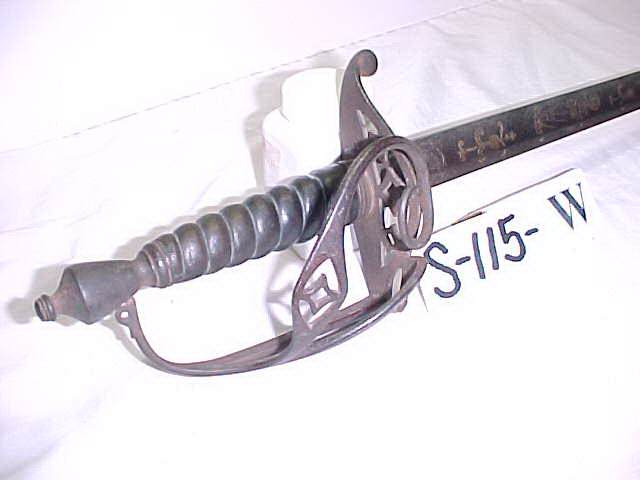
Cheers
GC




Awsome pics, Thanks. I believe I have run across Spadroon technique treatsie's before. I think I will see if I can find them on line again.
Here are my trio. I don''t have a group photo so these are a combination of dealer photos and my effort. The eagle pommel is of a different form than the Ketland typology but reflects the same time period. The slotted hilt is a bit of a mystery. I get varied opinions on it ranging from the 1770s right up to the War of 1812. My French Epee d'Anglais was the last in here and possibly the oldest of the bunch.
Cheers
GC
 Attachment: 35.69 KB
Attachment: 35.69 KB
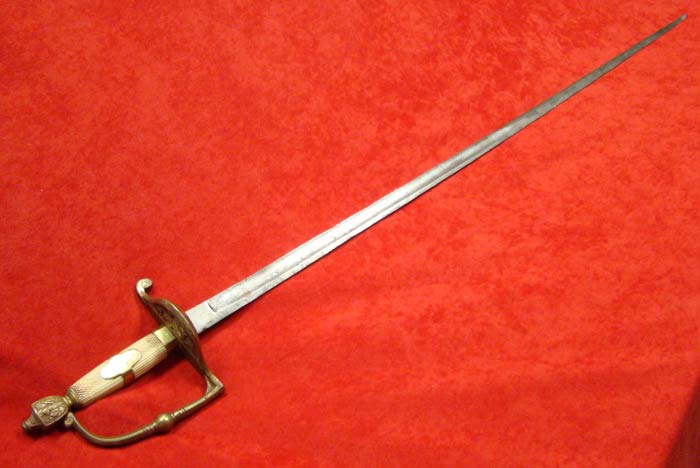
 Attachment: 30.89 KB
Attachment: 30.89 KB
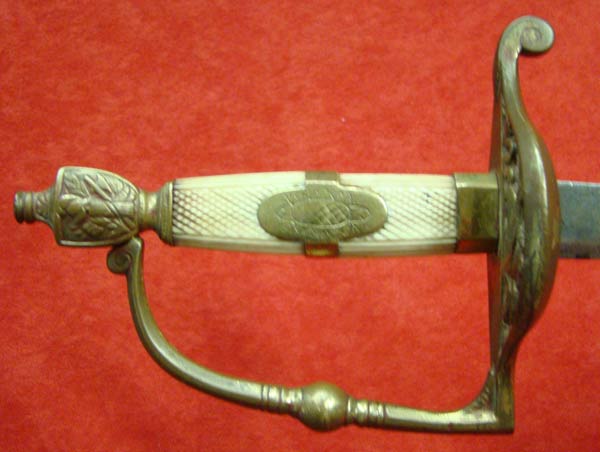
 Attachment: 36.92 KB
Attachment: 36.92 KB
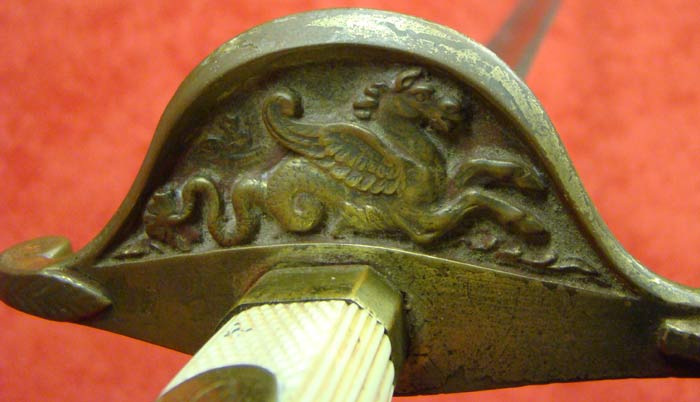
Cheers
GC



Is the blade on that 1786 Spadroon as long as it looks in the picture? :eek: It seems to stretch from here to there and back again. If it is that ong, it must have been for a truly tall man.
Here is a bit of Spadroon Drill!
 Attachment: 43 Bytes
Attachment: 43 Bytes


The 1786 blade pattern (it's not a full sword pattern, the hilt was still up to th regiment at that point), should be about 32" long, but they vary by an inch or two.
Nice sword Morgan, If it had been a UK sale you'd have had a fight on your hands :D
Two more spadroons of a similar design.
The first I'm very proud of, it was covered in crap when I bought it, when I cleaned off all the old varnish I found it had preserved almost all the original 200 year old polish to the blade. Same diamond insert as your's but in steel.
[ Linked Image ]
More standard Brass and ivory example, no insert in the side bar
[ Linked Image ]
Nice sword Morgan, If it had been a UK sale you'd have had a fight on your hands :D
Two more spadroons of a similar design.
The first I'm very proud of, it was covered in crap when I bought it, when I cleaned off all the old varnish I found it had preserved almost all the original 200 year old polish to the blade. Same diamond insert as your's but in steel.
[ Linked Image ]
More standard Brass and ivory example, no insert in the side bar
[ Linked Image ]
The eagle is about a thirty inch blade, the other two thirty-one. It is the photographic perspective. the French sword has a longer ricasso and substantially narrower blade. That one is 3/8" thick at the hilt, tapers rapidly over the first four inches and then has a more linear distal tape to the tip which is only 1/16" thick. the British Spadroons are typically thicker through the tip and wider for the length of the blade. With the American NCO swords and Prussian court and grenedier swords, we see the narrower blade as well but they are not as delicate or rapidly profile tapering as this French piece whose fuller is only half the blade length.
Cheers
GC
Cheers
GC
| D Critchley wrote: |
| The 1786 blade pattern (it's not a full sword pattern, the hilt was still up to th regiment at that point), should be about 32" long, but they vary by an inch or two.
Nice sword Morgan, If it had been a UK sale you'd have had a fight on your hands :D Two more spadroons of a similar design. The first I'm very proud of, it was covered in crap when I bought it, when I cleaned off all the old varnish I found it had preserved almost all the original 200 year old polish to the blade. Same diamond insert as your's but in steel. [ Linked Image ] More standard Brass and ivory example, no insert in the side bar [ Linked Image ] |
I really like the steel hilted Spadroon! I'm glad I didnt have the extra competition, I was utterly suprised to have won it!
Glen's eagle headed spadroon is lovely. Is it my imagination or does that have a shorter blade than is usual?
I know it is a little shorter than the others. let me actually measure them. 32 1/4" for the slotted hilt and 31 1/2". for the eagle. The French sword is 32 3/4".
I know the eagle has not been shortened, as the point is fairly pristine.
Cheers
GC
I know the eagle has not been shortened, as the point is fairly pristine.
Cheers
GC
I've been on-off interested in the spadroon ever since I found out what it was. It's one of those swords I'm really curious about how they were used.
Cut it out guys, you're making me drool. :eek:
Oh, hey! Are we posting pic of spadroons? Well, I don't mind if I do!
But before we get to that, I know you are thinking, "Hey, I have seen these terms '1786 Pattern' and '1796 Pattern' thrown around. What's the difference?" Thanks to D Critchley, here is your answer: 1786 and 1796 Infantry Swords. :D
British Pattern 1796 Infantry Officer's Sword:

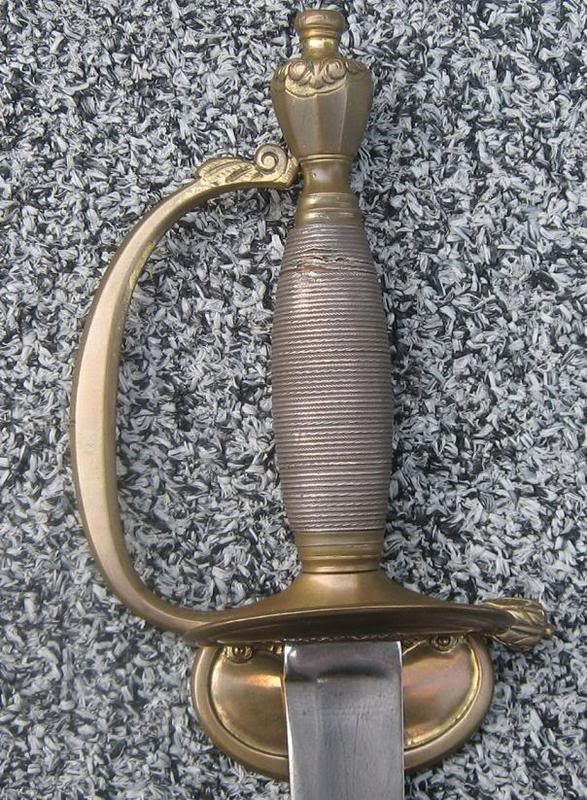
But before we get to that, I know you are thinking, "Hey, I have seen these terms '1786 Pattern' and '1796 Pattern' thrown around. What's the difference?" Thanks to D Critchley, here is your answer: 1786 and 1796 Infantry Swords. :D
British Pattern 1796 Infantry Officer's Sword:


I recently read that the Spadroon was popular for a time in the british army but fell out of faver due to many complaints from british officers for its "Gross inefficiancy during the Penninsular War." Also I have read in two different texts that the spadroon should be considered the precursor to the german fencing sabre. Anyone have anythng to add to that one way or the other?
Page 1 of 2
You cannot post new topics in this forumYou cannot reply to topics in this forum
You cannot edit your posts in this forum
You cannot delete your posts in this forum
You cannot vote in polls in this forum
You cannot attach files in this forum
You can download files in this forum
All contents © Copyright 2003-2006 myArmoury.com — All rights reserved
Discussion forums powered by phpBB © The phpBB Group
Switch to the Full-featured Version of the forum
Discussion forums powered by phpBB © The phpBB Group
Switch to the Full-featured Version of the forum